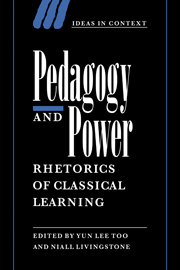Book contents
- Frontmatter
- Contents
- Notes on contributors
- Acknowledgements
- Introduction
- 1 Classics: from discipline in crisis to (multi-)cultural capital
- 2 Schoolboys and gentlemen: classical pedagogy and authority in the English public school
- 3 ‘Die Zung’ ist dieses Schwert': classical tongues and gendered curricula in German schooling to 1908
- 4 ‘What does that argue for us?’: the politics of teaching and political education in late eighteenth-century dialogues
- 5 Women and classical education in the early modern period
- 6 Pilgrimage to Parnassus: local intellectual traditions, humanist education and the cultural geography of sixteenth-century England
- 7 ‘Not so much praise as precept’: Erasmus, panegyric, and the Renaissance art of teaching princes
- 8 Teachers, pupils and imperial power in eleventh-century Byzantium
- 9 Reading power in Roman Greece: the paideia of Dio Chrysostom
- 10 Children, animals, slaves and grammar
- 11 A good man skilled in politics: Quintilian's political theory
- 12 The voice of Isocrates and the dissemination of cultural power
- 13 Xenophon's Cyropaedia: disfiguring the pedagogical state
- Select bibliography
- Index
- IDEAS IN CONTEXT
5 - Women and classical education in the early modern period
Published online by Cambridge University Press: 30 September 2009
- Frontmatter
- Contents
- Notes on contributors
- Acknowledgements
- Introduction
- 1 Classics: from discipline in crisis to (multi-)cultural capital
- 2 Schoolboys and gentlemen: classical pedagogy and authority in the English public school
- 3 ‘Die Zung’ ist dieses Schwert': classical tongues and gendered curricula in German schooling to 1908
- 4 ‘What does that argue for us?’: the politics of teaching and political education in late eighteenth-century dialogues
- 5 Women and classical education in the early modern period
- 6 Pilgrimage to Parnassus: local intellectual traditions, humanist education and the cultural geography of sixteenth-century England
- 7 ‘Not so much praise as precept’: Erasmus, panegyric, and the Renaissance art of teaching princes
- 8 Teachers, pupils and imperial power in eleventh-century Byzantium
- 9 Reading power in Roman Greece: the paideia of Dio Chrysostom
- 10 Children, animals, slaves and grammar
- 11 A good man skilled in politics: Quintilian's political theory
- 12 The voice of Isocrates and the dissemination of cultural power
- 13 Xenophon's Cyropaedia: disfiguring the pedagogical state
- Select bibliography
- Index
- IDEAS IN CONTEXT
Summary
INTRODUCTION
The relevance of classical education to women was very much a subject of debate in the sixteenth and seventeenth centuries. There is an enormous literature concerned with the proper extent of female learning, much of it in the form of lists, or catalogues, of learned women (to be discussed later in this chapter). Clearly, many were against it: equally clearly, many educators, both male and female, spoke in favour of educating girls, and a good few actually did so. My chapter will attempt to focus on both the debate itself, and its social and cultural consequences.
What complicates this subject is the enormous mass of evidence more or less indirectly about educated women, compared with the small quantity of actual surviving works by women. This means that, even today, discussions of women's opportunities and achievements tend to consist of the bandying about of secondary authorities. The same few names, linked by phrases such as ‘is said by contemporaries to…’ appear all too often. Male defenders of women's education have in effect intruded themselves as spokesmen for early modern women rather than allowing them to speak for themselves, a situation not without its parallels among more recent male feminists.
- Type
- Chapter
- Information
- Pedagogy and PowerRhetorics of Classical Learning, pp. 83 - 109Publisher: Cambridge University PressPrint publication year: 1998
- 1
- Cited by



